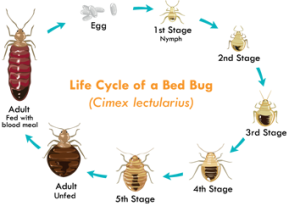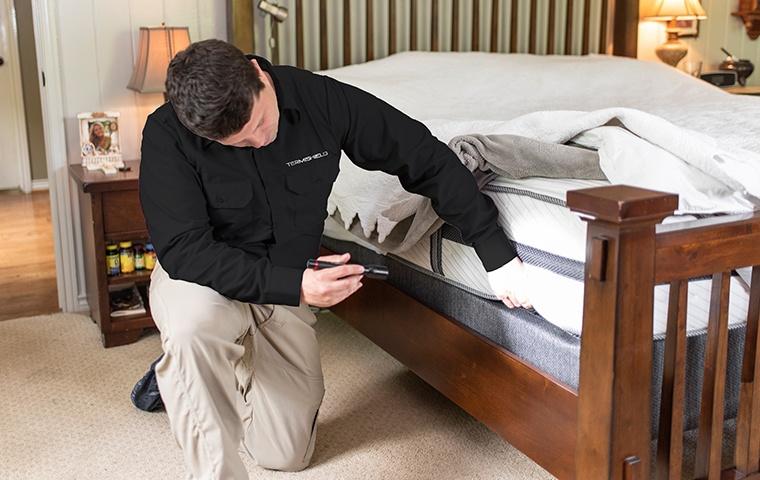Kings Cincinnati Bug Control Companies: Reliable Services
Sorts Of Bug Control: Which Technique Is Right for Your Problem?
When faced with an insect infestation, the option of an appropriate approach for insect control is crucial in successfully handling the scenario. By discovering the numerous kinds of insect control approaches offered, people can make enlightened decisions tailored to their special circumstances, making certain a much more sustainable and efficient result in insect removal.
Chemical Parasite Control
Chemical bug control involves the use of synthetic or naturally obtained chemicals to manage and eradicate pest populations efficiently. This method is generally used in farming, forestry, and residential setups to deal with a large range of bugs, consisting of pests, rats, and weeds. Making use of chemical pesticides can supply fast and targeted remedies to pest invasions, making it a preferred selection for lots of individuals and companies.
Among the essential benefits of chemical insect control is its capability to swiftly remove parasites, reducing the danger of damage to crops, property, and human health and wellness. By making use of particular chemicals that target certain insects, this method can effectively manage invasions while lessening damage to helpful organisms and the atmosphere when used correctly.
Nevertheless, the usage of chemical insect control likewise raises worries concerning prospective unfavorable results on non-target varieties, water sources, and human health. It is essential to comply with safety standards, apply chemicals responsibly, and take into consideration different bug control techniques to reduce these dangers and ensure sustainable pest management methods.
Biological Bug Control
Biological bug control, also understood as biocontrol, utilizes living organisms to handle and lower insect populations naturally. This approach uses the power of nature to control bugs without the requirement for synthetic chemicals. Biocontrol can include the intro of all-natural adversaries of the bug types, such as bloodsuckers, killers, or virus, to subdue bug populations. By utilizing the insect's all-natural killers or microorganisms, biological bug control supplies a ecologically pleasant and sustainable solution to pest administration.

Mechanical Parasite Control
Making use of manual and physical techniques to handle bug populaces, mechanical insect control provides a different approach that does not depend on using living microorganisms or synthetic chemicals. This method entails making use of barriers, catches, or various other devices to physically deter or eliminate bugs. By obstructing insect access factors or setting up traps to catch them, mechanical insect control can effectively decrease problems without introducing chemicals into the atmosphere.
One usual instance of mechanical pest control is the usage of mesh displays on windows and doors to stop pests from going into buildings. This straightforward yet efficient method functions as a physical obstacle, keeping pests out while permitting for correct air flow. Additionally, gadgets like mousetraps, fly swatters, and ultrasonic repellents drop under the mechanical bug control category.
While mechanical pest control techniques can be labor-intensive and require regular surveillance and upkeep, they provide a environmentally friendly and lasting remedy for taking care of insect infestations. By integrating different mechanical techniques, residential property owners can create a detailed bug control approach that decreases reliance on chemical pesticides.
Physical Bug Control

Some usual physical pest control methods consist of making use of barriers such as screens or webs to stop bug entry, catches to record and eliminate pests, and hand-picking to literally eliminate bugs from plants or structures. In addition, techniques like warm therapies can be made use of to control pests like bed bugs by increasing the temperature to levels that are deadly to the pests.
Physical parasite control is specifically useful in integrated parasite administration (IPM) approaches, where numerous parasite control methods are incorporated for reliable pest management while minimizing making use of chemicals. By utilizing physical insect control methods, individuals can successfully resolve parasite invasions with marginal environmental effect.
Integrated Insect Management
When executing physical bug control methods as part of pest management strategies, Integrated Parasite Management (IPM) emerges as a comprehensive method that leverages different techniques to successfully control pest populaces. IPM concentrates on long-lasting prevention of pests with a combination of organic, social, physical, and chemical devices tailored to particular pest issues. By integrating numerous control methods, IPM aims to decrease the risks connected with insects while likewise reducing reliance on chemical options.
One trick element of IPM is the focus on surveillance and examining pest populations to establish one of the most appropriate control approaches. This aggressive approach allows for early treatment and targeted methods, resulting in much more effective insect administration. Additionally, IPM promotes eco-friendly methods by focusing on non-chemical control methods and only using pesticides as a last hotel.
Conclusion

By using the pest's all-natural killers or virus, organic insect control supplies a eco pleasant and sustainable solution to pest administration. - Kings pest control Cincinnati
Utilizing physical and hands-on techniques to take care of bug populations, mechanical insect control uses an alternative method that does not depend on the usage of living organisms or synthetic chemicals.An effective approach to managing pest populaces without relying on chemical or biological methods entails the usage of physical parasite control techniques.When executing physical insect control techniques as Click This Link component of insect administration approaches, Integrated Parasite Management (IPM) arises as a detailed method that leverages different methods to properly control pest populations. Chemical pest control involves the use of pesticides, biological parasite control utilizes look at this website natural killers, mechanical insect control includes physical barriers, physical parasite control consists of capturing or getting rid of insects, and integrated parasite monitoring integrates multiple methods for a holistic strategy to pest control.